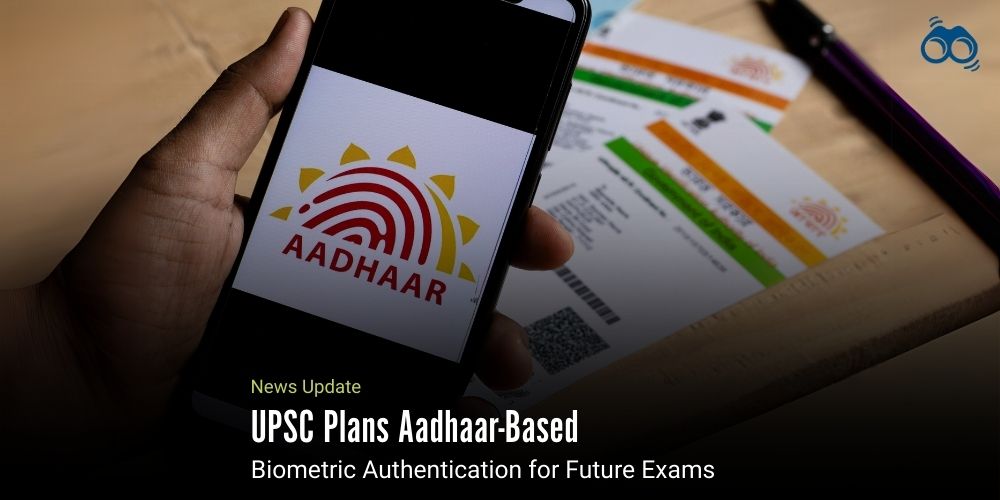Civil Services Exam Faces Major Security Overhaul Following Fraud Controversy
Biometric Security and AI Surveillance: UPSC’s New Measures Against Malpractices
The Union Public Service Commission (UPSC) is set to introduce Aadhaar-based biometric authentication for its examinations from June, aiming to curb malpractices. Reports suggest that this initiative will enhance security by verifying candidates' identities through fingerprint authentication, facial recognition, and QR code scanning of e-admit cards.
However, sources indicate that the Civil Services (Preliminary) Examination 2025, scheduled across 80 centres for nearly 9.5 lakh candidates, will not adopt this new system. The UPSC reportedly initiated the project in June last year, inviting bids from public sector undertakings for the development of digital fingerprint capturing and AI-based CCTV surveillance systems. These measures seek to strengthen the integrity of the examination process and ensure a transparent, fair assessment system.
On 28 August 2024, the Department of Personnel and Training authorised the UPSC to conduct voluntary Aadhaar authentication to confirm candidates' identities during registration on the 'One Time Registration' portal and at various stages of examinations or recruitment tests. Authentication would be carried out using Yes/No validation or the e-KYC facility. From June, the UPSC will implement Aadhaar-based biometric authentication across all examinations. UPSC chairman Dr Ajay Kumar stated that this measure aims to enhance security, prevent malpractices, and improve candidate verification during recruitment for Group A and Group B posts in the Union Government.
The UPSC plans to introduce Aadhaar-based fingerprint authentication, facial recognition, and QR code scanning of e-Admit Cards to prevent impersonation, alongside AI-based CCTV surveillance to deter cheating. This initiative follows scrutiny over the case of Puja Khedkar, a former IAS probationer dismissed for alleged forgery and misconduct. Her candidature for the Civil Services Examination (CSE) 2022 was cancelled in July 2024 after she exceeded the permitted number of attempts and applied under multiple names. The Department of Personnel and Training (DoPT) later dismissed her from service. Khedkar denies the charges and is contesting the decision in court.
As part of its efforts to uphold fairness and transparency, the UPSC reviewed the examination attempts of over 15,000 candidates from 2009 to 2023, following Khedkar’s case. In a statement on 31 July last year, UPSC confirmed that, apart from Khedkar, no candidate had exceeded the permitted number of attempts under Civil Services Examination (CSE) rules. The UPSC acknowledged that its Standard Operating Procedure (SOP) failed to detect Khedkar’s actual number of attempts due to changes in her name and her parents’ names during the application process. In response, the commission is working to strengthen its verification procedures to prevent similar cases in the future, highlighting the need for more robust mechanisms within the examination system. The new authentication measures reflect the UPSC's commitment to ensuring a secure and transparent recruitment process.
Editor’s Note:
The Union Public Service Commission's (UPSC) decision to introduce Aadhaar-based biometric authentication is a crucial step towards ensuring integrity in the examination process. With fingerprint authentication, facial recognition, and QR code scanning of e-admit cards, the system will significantly reduce impersonation and fraudulent practices. AI-based CCTV surveillance will further strengthen security, making it harder for candidates to cheat. Given the scale of UPSC exams and the high stakes involved, these measures will provide much-needed transparency and fairness. Recent controversies, such as the case of Puja Khedkar, have highlighted gaps in the verification process, exposing loopholes that could be exploited. By implementing stronger authentication mechanisms, the UPSC is demonstrating its commitment to upholding merit and credibility in the recruitment process.
Skoobuzz asserts that, while change always comes with challenges, this reform will reinforce trust in UPSC examinations and ensure that deserving candidates are selected based on their merit.














0 Comments (Please Login To Continue)